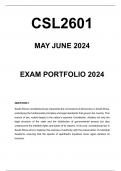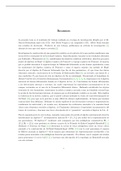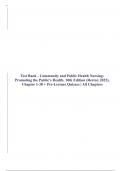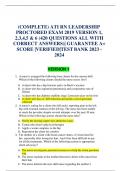Exam (elaborations)
CSL2601 PORTFOLIO MEMO - MAY/JUNE 2024 - SEMESTER 1 - UNISA - DUE DATE :- 15 MAY 2024 (DETAILED ANSWERS WITH FOOTNOTES AND BIBLIOGRAPHY - DISTINCTION GUARANTEED!)
- Institution
- University Of South Africa (Unisa)
CSL2601 PORTFOLIO MEMO - MAY/JUNE 2024 - SEMESTER 1 - UNISA - DUE DATE :- 15 MAY 2024 (DETAILED ANSWERS WITH FOOTNOTES AND BIBLIOGRAPHY - DISTINCTION GUARANTEED!)
[Show more]













